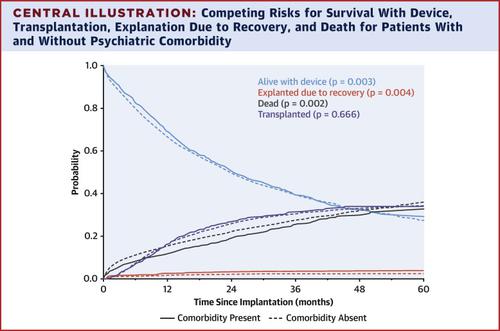JACC: Heart Failure ( IF 13.0 ) Pub Date : 2020-06-10 , DOI: 10.1016/j.jchf.2020.03.011 Clancy Mullan 1 , Cesar Caraballo 2 , Neal G Ravindra 3 , P Elliott Miller 4 , Megan McCullough 5 , Kelly Brown 6 , Tsung Wai Aw 6 , Jadry Gruen 5 , John-Ross D Clarke 7 , Eric J Velazquez 3 , Arnar Geirsson 1 , Makoto Mori 1 , Nihar R Desai 8 , Tariq Ahmad 9

|
Background
Psychiatric comorbidities play a key role in patient selection for left ventricular assist devices (LVADs), but their impact on clinical outcomes is unknown.
Objectives
The goal of this study was to examine the clinical impact of psychiatric illness on outcomes in patients receiving LVADs for end-stage heart failure (HF).
Methods
The study identified adults in the Interagency Registry for Mechanically Assisted Circulatory Support with psychiatric comorbidities (history of alcohol abuse, drug use, narcotic dependence, depression, and other major psychiatric diagnoses) receiving continuous-flow LVADs from 2008 to 2017. Demographic characteristics, survival, adverse events, and quality of life scores were compared for patients with and without each psychiatric comorbidity.
Results
Over the study period, the prevalence of psychiatric comorbidities was low: alcohol abuse, n = 1,093 (5.5%); drug use, n = 1,077 (5.4%); narcotic dependence, n = 96 (0.5%); depression, n = 401 (2.0%); and other major psychiatric illnesses, n = 265 (1.4%). Narcotic dependence (adjusted hazard ratio: 1.9; 95% confidence interval: 1.2 to 3.0; p = 0.004) and other major psychiatric illnesses (adjusted hazard ratio: 1.4; 95% confidence interval: 1.0 to 1.9; p = 0.02) were associated with increased risk of mortality, whereas alcohol abuse, drug use, and depression were not. All comorbidities except narcotic dependence were associated with increased risk of rehospitalization and device-related infection (both p < 0.05). Kansas City Cardiomyopathy Questionnaire scores were lower from 6 to 24 months’ post-implantation among patients with psychiatric comorbidities (p < 0.05).
Conclusions
Despite a low prevalence of psychiatric comorbidities among LVAD recipients, these conditions were associated with mortality risk, adverse events, and poorer quality of life. Further study is needed to understand how specific psychiatric conditions affect outcomes and how to best manage this vulnerable patient population.
中文翻译:

左心室辅助装置植入后末期心力衰竭的精神病合并症和预后。
背景
精神病合并症在选择左心室辅助装置(LVAD)的患者中起关键作用,但其对临床结果的影响尚不清楚。
目标
这项研究的目的是检查精神疾病对接受终末期心力衰竭(HF)的LVAD患者的预后的临床影响。
方法
该研究在2008年至2017年间连续接受LVAD的精神病合并症(酗酒,吸毒,麻醉依赖,抑郁和其他主要精神病学史)的机械辅助循环支持机构间登记处中识别出成年人。人口统计学特征,生存率对患有和不患有每种精神病合并症的患者的不良反应,不良事件和生活质量评分进行了比较。
结果
在研究期间,精神疾病合并症的患病率很低:酗酒,n = 1,093(5.5%);药物使用,n = 1,077(5.4%);麻醉依赖性,n = 96(0.5%);抑郁,n = 401(2.0%); 和其他重大精神疾病,n = 265(1.4%)。麻醉依赖(调整后的危险比:1.9; 95%可信区间:1.2至3.0; p = 0.004)和其他主要精神疾病(调整后的危险比:1.4; 95%可信区间:1.0至1.9; p = 0.02)与死亡风险增加,而酗酒,吸毒和抑郁却没有。除麻醉药依赖外,所有合并症均与再次住院和器械相关感染的风险增加相关(均p <0.05)。
结论
尽管LVAD接受者中精神病合并症的患病率较低,但这些情况与死亡风险,不良事件和较差的生活质量有关。需要进一步研究,以了解特定的精神疾病如何影响预后以及如何最好地管理这一脆弱的患者人群。



























 京公网安备 11010802027423号
京公网安备 11010802027423号